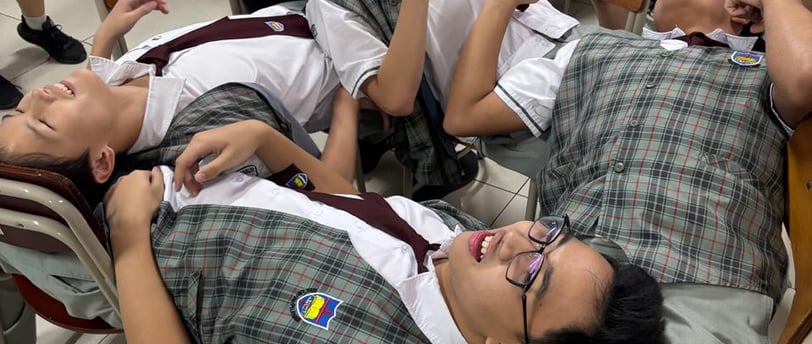The Journey
Outlining the challenges and outcomes of our research
BLOGS
Aaron Sinclair. L
12/13/20243 min read


Our team recently took on a remarkable project called “Assessing the Influence of Esports Engagement on Academic and Social Outcomes on High School Students in Bandung.” We chose this topic because esports is becoming a significant part of many young people's lives today. As technology continues to evolve, we want to understand how it affects students, both positively and negatively. Our goal was to explore how high school students in Bandung engage with esports and suggest ways schools might include it in their programs.
From the very beginning, each of us brought our own ideas and experiences to the project. Some team members highlighted the positive aspects of esports, like how it can help teenagers learn teamwork and improve their problem-solving skills. However, we also worried about how too much gaming could impact students’ grades and social skills. We realized that parents play a crucial role in managing screen time, which can help balance gaming with schoolwork.
As we dug deeper into local perspectives, we discovered that esports is incredibly popular among young people in Indonesia. With affordable smartphones and good internet access, games like Mobile Legends, PUBG Mobile, and Free Fire have captured the attention of many teens. Some view esports as more than just a hobby; they see it as a potential career because of successful streamers who earn money doing what they love. Organizations like the Indonesian Esports Association (IESPA) have helped promote esports in our country, and even the government has recognized its importance by including it in events like the Asian Games.
On a global scale, esports has gained significant attention over the years. Games like Dota 2 have turned esports into a worldwide phenomenon. This growth shows that esports is not just for fun; it can also create job opportunities and contribute to economic development.
To gather information for our project, we used surveys and interviews. We created surveys using Google Forms to collect opinions from students about their experiences with esports. We also looked at data from the United States to see how screen time and gaming habits might be similar or different here. Each member of our team took on specific roles—some focused on research while others wrote questions or collected data.
Our team consisted of five dedicated members:
- Rafael Chiu: He led the research on the background and purpose of our study, helping us understand why this topic matters.
- Aaron Sinclair: Aaron was responsible for formulating the research questions that guided our study.
- Matthew Wilson: Matthew managed the conceptual framework and literature review, gathering existing research to support our findings.
- William Pangestu: William collected and processed data from our surveys and interviews, ensuring we had accurate insights.
- Marc Tjhin: Marc interviewed parents, teachers, and students while editing our final video presentation.
Throughout our project, we faced several challenges. One major issue was scheduling interviews with parents and teachers because they often had busy lives. It was tough to find people who could share their thoughts with us. Additionally, coordinating schedules among our team members was sometimes tricky. To overcome these challenges, we contacted friends and family who could provide insights when parents were unavailable. We also organized meetings during weekends at church or other community events where we could gather information more easily.
As we continued our work, we interviewed students, teachers, and parents to better understand their views on esports. Even though some interviewees knew little about our research topic, their responses surprisingly matched what we were looking for. This helped us gather valuable information that enriched our findings.
In the final stages of our project, we worked together to create a website that showcased our research findings in an easy-to-understand way. Team members contributed content for the site and helped write blog posts that captured our journey throughout the project.
Looking back on this experience, it’s clear that exploring topics like esports can be both rewarding and eye-opening. Our project highlights the need for open conversations about how modern technology can fit into education. By understanding both the good and bad sides of esports engagement among high school students in Bandung, we hope to contribute to discussions about how schools can use esports positively while minimizing any negative effects.
Overall, this project has been a fantastic learning experience for all of us. It not only deepened our understanding of esports but also strengthened our teamwork skills as we navigated challenges together. As we look ahead in a world where technology plays such a big role in our lives, finding ways to use tools like esports responsibly is essential for helping young people develop skills that go beyond just gaming.